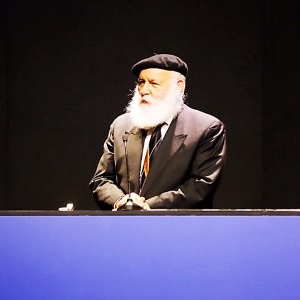
SA

Healing through meditation
REPHAEL PERKEL
Wolf was born in 1947 in Krakow, Poland, the son of Holocaust survivors. His father was part of the Radomsko Chassidic community in Poland, which was virtually annihilated by the Nazis.
Two years later, when the family arrived to settle in Australia, they found within the emerging community of Chabad Chassidim something of the culture they were familiar with in Eastern Europe. Laibl and his brother were educated in the Chabad school system.
During the 1970s, the hippie generation was creating a major spiritual revolution in the Western world. Various enterprising gurus introduced meditation practices from the East, and these became especially popular.
In 1979, the Lubavitcher Rebbe gave a public discourse on meditation. Wolf explains that this was at a point in history where most rabbis had forbidden the use of meditation because of the adverse spiritual effects of Eastern influences foreign to Judaism.
Yet the Rebbe had instructed people to seek out the positive elements within meditation, to be used for their therapeutic value in dealing with issues such as depression and stress management. Creating such a mechanism devoid of foreign spiritual influences, he felt, would also provide seekers with an alternative to the Eastern formats that was compatible with their own spiritual heritage.
“I thought that this would be a great bridge towards younger Jewish people, who were genuinely on a quest for some more meaning in their lives and were turning to Eastern formats,” says Rabbi Wolf. “I wanted to be able to develop an alternative that would draw them back towards yiddishkeit.”
For Wolf, the application of certain Eastern techniques was well suited to the fulfilment of the mitzvah (divine injunction) to maintain a healthy body and mind.
He defines consciousness as the human experience of the neshamah (soul) operating through the body.
“At the same time, there’s a breadth we can accomplish in terms of consciousness,” he explains. “We can live the moment more deeply or more superficially.”
An analogy he is fond of using is the idea of swimming on the surface of the ocean versus scuba diving. “We can live on the ‘surface’ of life, having some level of consciousness and enjoyment; but that’s cheating oneself out of living much more profoundly. That’s what I call living ‘vertically’, which provides us with a much greater vista of the beauty and innate wondrousness of the moment.”
When I asked Rabbi Wolf for his perspective on my own understanding of enlightenment as an awareness of context, he suggested that this aspect of wisdom – seeing something as part of the all, as opposed to simply seeing the thing itself – is to have a broader vista of the meaning of each encounter.
This can manifest, for example, in effective parenting, where attention is paid to a child’s personality, abilities, stage of development and how he/she relates to the world. That context provides a far greater opportunity to be wise in the way that you guide the child through life. In general, awareness of context provides an amplified basis of meaning.
For Rabbi Wolf, in accordance with Jewish mystical teachings, who we are in essence is not our body, but our soul. The body is the “clothing” that G-d has given us for the soul to express itself in this world.
Identifying with the body, he says, is a distortion in our sense of the nature of the self.
In the context of health and well-being, Rabbi Wolf shares the contemporary, scientifically demonstrated view that our state of mind and our responses to life directly affect our body processes.
Therefore, if, through the mechanism of meditation, we can generate a more positive outlook on life, this significantly accelerates, and perhaps even enables, the healing process. If a healing practitioner and patient/client were to meditate together, says Rabbi Wolf, he believes there would be greater healing.
All of this connects with a profound teaching of the Tzemach Tzedek (1789-1866), an early generation Chabad Chassidic Rebbe, who asserted that positive thinking is a choice we all have available to us, and that this choice produces a positive outcome.
- Rephael Mendel (Ray) Perkel has been devoted to the study of Chassidic wisdom, Kabbalah and personal development for over 40 years. This has evolved into a passion for integrating spirituality with psychological healing and transformation.




